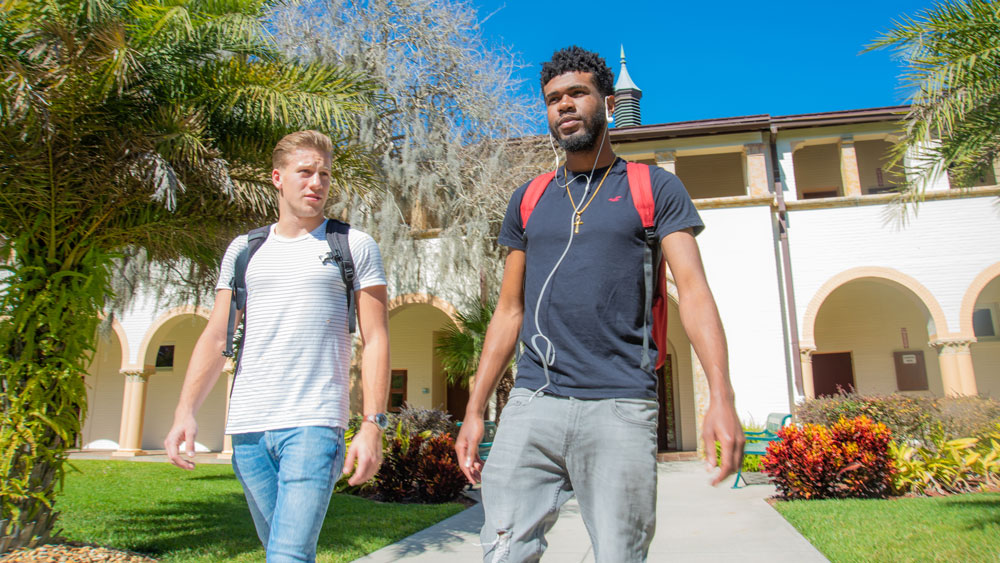The month of June has been designated as Men's Health Month since the early 1990s, when health advocates persuaded Congress that men were sufficiently aware of the healthy habits they needed to adopt and the screenings they need to have to maintain healthy, happy lives.
At Saint Leo University, students have always been encouraged to strive to develop the mind, spirit, and body for a balanced life, just as the goals of Men's Health Month suggest. This is particularly evident this year at University Campus, where the new College of Health Professions is promoting three new degree programs, and where a new, 59,000-square foot Wellness Center is under construction along the shore of Lake Jovita for a November opening.
These developments enhance the opportunities that Saint Leo already provided the traditional age undergraduate population attending University Campus. They include wide, open green spaces for impromptu relaxation and exercise, lakeside recreation, intramural sports, outdoor stretching classes, University Ministry, counseling services, and even a required academic class on personal wellness.
So when students return to campus for the Fall 2021 Semester, the ongoing encouragements to pursue a healthy, balanced life will be even stronger, and be conveyed to both men and women, according to Dr, Kathleen Van Eerden, dean of the College of Health Professions.
Day-to-day habits
Regardless of gender, young adults away from home for the first-time encounter aspects of life that can prove to be either opportunities to adopt or strengthen healthy habits, or pitfalls, she said. Naturally, pitfalls are best avoided, but students can also overcome mistakes by making use of the all the resources Saint Leo has to offer.
For instance:
- Exercise can be a pitfall for students who do not yet incorporate exercise into their daily lives on their own, and are not a member of a sports team or part of the ROTC program. But the existing campus landscape already encourages walking, Van Eerden noted. And when the Wellness Center opens, it will add an infinity pool, a multipurpose gymnasium with an indoor walking track, and a fitness area with cardio equipment, free weights and machines, a dance studio, yoga studio, and cycling center. There will be a variety of scheduled classes offered, too.
- Diet can be a pitfall for students tempted by the variety of foods offered by Dining Services, as the cliché about college students subject to the "freshman 15" weight gain suggests. On the other hand, Dining Services always offers healthy options, and the Wellness Center will feature a café with menu options including smoothies, salads, wraps, and snacks.
- Sleep habits can be new territory for students who were used to having parents or guardians awaken them in the morning. College is an opportunity to establish an independent, healthy routine with enough hours of restful sleep, Van Eerden said.
- Stress relief and management is available not only through exercise and diet, but also through the counseling services the university provides and University Ministry's spiritual support and fellowship. Those offices will be part of the new Wellness Center and so highly visible to students. Counseling services includes prevention around substance abuse prevention, which can be a pitfall for students, Van Eerden noted. "If you can successfully deal with stresses while a student by developing healthy habits, it will serve you well through life," Van Eerden said.
- Injury prevention is something some young people do not think of … until they are injured. The Wellness Center's safe recreational activities and classes can help promote more awareness.
In addition, regular campus health services provide student-patients with consultation and treatment on an individual basis. The Health Services office will also be in the Wellness Center.
Saint Leo also runs campus-wide education programs through its Green Dot initiative, which helps students become a part of maintaining a safe campus environment for everyone.
The College of Health Professions
Van Eerden is also hoping the presence of students enrolling in the new College of Health Professions programs offered on campus will have a positive, if subtle, influence.
Students, female and male, are being accepted into the university to begin as pre-nursing students in the fall, and those who meet requirements after four semesters will be admitted to the upper-level Bachelor of Science in Nursing program at University Campus. The College of Health Professions also offers a Bachelor of Science degree in health education and health promotion on University Campus, for health-minded individuals who would enjoy filling an educational role at a public health agency, a business, or a non-profit agency.
Van Eerden said she hopes the presence of these students and their natural inclination toward health will bring about a positive influence on peers. Their degree programs, in fact, will teach them how to support the health of the communities in which they live, she noted.
All the degree programs from the College of Health Professions align with the "Culture of Health" philosophy advanced in the United States by the influential Robert Wood Johnson Foundation, a healthcare philanthropy. The Culture of Health emphasizes that professionals should consider the health of people holistically, not solely in terms of an ailment that prompted them to seek care, and that professionals should also be concerned with the health of the family and the community and the factors that influence the people within those spheres. Additionally, it stresses that clinicians prioritize their own health, the well-being of co-workers and their workplace. The ultimate goal is to assure that everyone is able to achieve the healthiest life possible, so it includes long-range thinking as well. Van Eerden is convinced that the Saint Leo University emphasis on health and the impact of health-minded students in the College of Health Professions should support "a vibrant, health affirming environment for all University Campus students."
